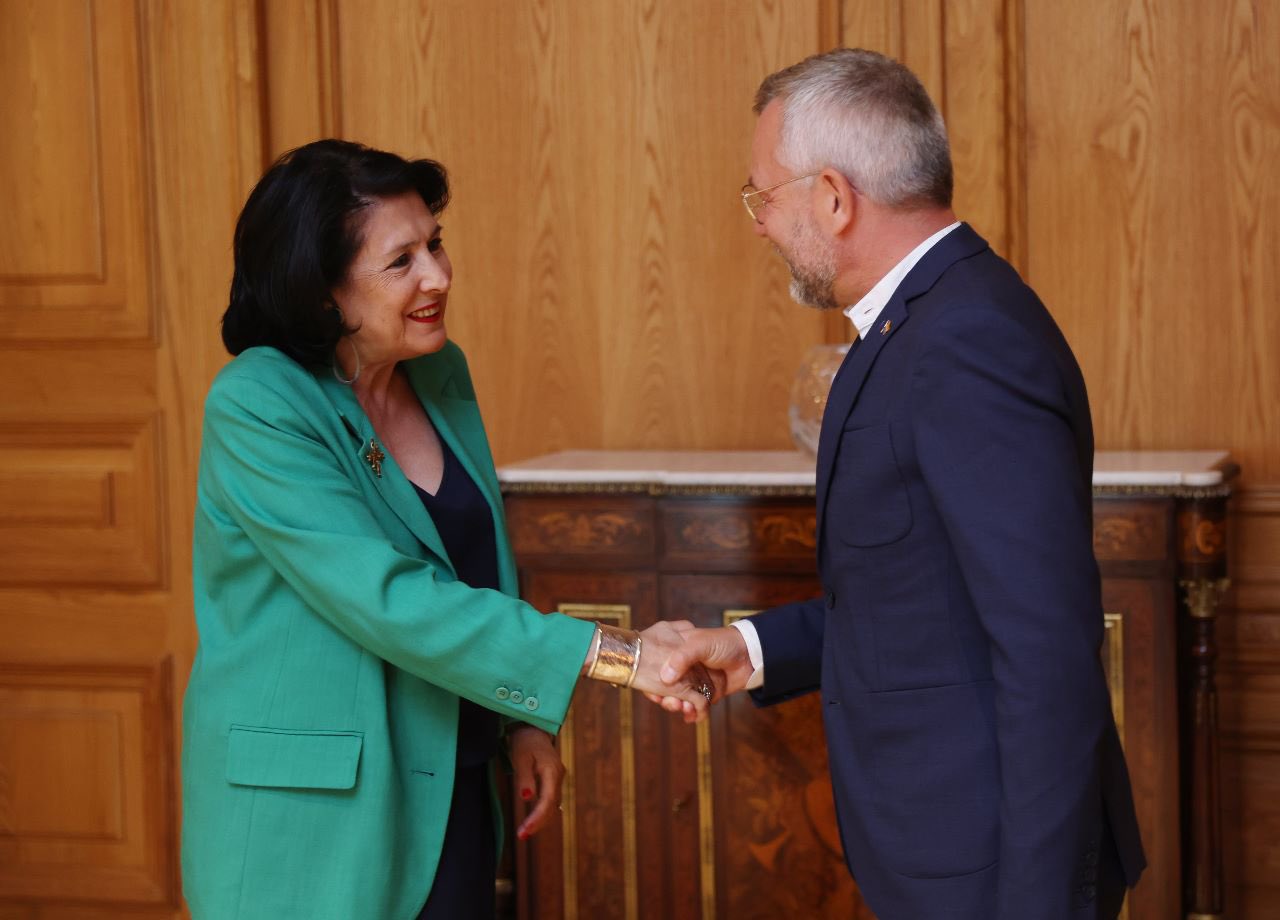
Chair of Bundestag Foreign Affairs Committee: “without Georgia, the European Union is not complete”
Chairman of the Foreign Affairs Committee of the German Bundestag, Michael Roth, is currently on a working visit to Tbilisi since June 5. As part of his visit, he has met with Georgia’s president, Salome Zurabishvili, the Foreign Minister, Ilia Darchiashvili, the Speaker of the parliament, Shalva Papuashvili, and the Chairman of the Foreign Relations Committee, Nikoloz Samkharadze. Additionally, he held a meeting with representatives from civil society and representatives of the opposition parties.
Furthermore, on June 5, he conducted a press conference addressing Georgia’s path to the EU and emphasized the importance of implementing the 12 priorities outlined by the European Commission.
Press Conference
During the press conference, Michael Roth, expressed his support for Georgia’s aspirations to join the European Union while acknowledging that there is still much work to be done. He emphasized the EU’s admiration for the strong pro-EU sentiment among the Georgian society, stating that the EU feels a sense of obligation to assist and support Georgia on its EU integration path. However, he raised concerns about the messages received from the Georgian government in recent months, questioning if these signals align with the genuine desire of the Georgian people to join the European Union: “In the last couple of months we received some weird messages from Tbilisi. And I’m not quite sure if these signals we received are fully in line with the desire of the Georgia people to join the European Union”. While the EU is committed to supporting Georgia, Roth stressed that the government must fully recognize its responsibility in this endeavor.
He emphasized that the implementation of the 12 priorities outlined by the European Commission is crucial for attaining candidate status, underscoring the significance of safeguarding the rights of civil society representatives along this path. Referring to the Foreign Agents laws, he found it hard to comprehend from the EU vantage point, given that Georgia is expected to align its values with those of the EU, and the protection of civil society is a core EU value. He also highlighted the utmost importance of protecting LGBTQI rights, as it aligns with the EU’s guiding principle of safeguarding human rights. He emphasized that the time has come for Tbilisi to implement reforms and progress. He said Germany is ready to play the role of an “honest broker” stating: “We would like to build bridges, but bridges which are not just acceptable and comfortable for politicians, but also acceptable and comfortable for citizens, for the civil society”.
He expressed support for the participants of the protest rally on June 2-3 saying: And people here in your country, who demonstrate on the street, with tent rallies for European values, are not criminals, and we shouldn’t criminalize them.” He added: ” So if they are fully in line with the law, I don’t understand why they have to suffer in prisons.”
When asked about what Georgia should anticipate from the EU by the end of the year, he emphasized the necessity for reforms in areas such as the judiciary, human rights protection, and democracy. He pointed out that the EU has expanded its focus towards the South Caucasus region, and that now is the opportune moment for the Georgian government to take action. Furthermore, he made a commitment to advocate for further EU enlargement, asserting that “without Georgia, the European Union is not complete.”
Furthermore, he expressed his dissatisfaction with the Prime Minister’s recent statements regarding the war in Ukraine, stating: “…And yes, indeed, I was very much irritated about some public statements of your Prime Minister. And I don’t understand why a politician who believes in the European future of his country spreads Russian narratives.” He urged against following or spreading these narratives, highlighting that Russian imperialism and colonialism were the reasons behind the Russian army’s attack on Ukraine, as well as the occupation of 20% of Georgian territory by Russian troops in 2008, not NATO. He emphasized that the decision to apply for EU or NATO membership was the free choice of independent and sovereign countries like Ukraine and Georgia, not a result of strategies from Brussels, Berlin, or Washington.
When asked about the existence of a backup plan for Georgia in case candidate status is not granted at the upcoming European Council meeting, Michael Roth remarked that there is still ample time to enact the necessary reforms. He emphasized his lack of support for the notion of a plan B, as he firmly believes that candidate status should indeed be bestowed upon Georgia. He encouraged Georgia to maintain its momentum and not lose sight of its goals.
Roth also addressed the tension between the Georgian Dream and the Party of European Socialists, highlighting their departure from the party with an unusual argument. He said: “They [Georgian Dream] left the Social Democratic Party of Europe with the weird argument, [that] we shouldn’t talk about LGBTI rights and human rights, we should talk about social justice.” He clarified that social democracy encompasses more than just the concept of equality and social justice. It also includes equality between women and men, as well as respect for all minorities—whether cultural, religious, sexual, or ethnic. He expressed view that these various challenges should not be separated but instead approached together in order to establish a progressive and promising strategy of rapprochement with the European Union.
Also Read:
- 03/05/2023 – Parliament Chair Meets with German Bundestag Delegation
- 14/04/2023 – German Ambassador Peter Fischer: “The door is wide-open for Georgia”
- 24/03/2023 – German FM Annalena Baerbock Visits Georgia
This post is also available in: ქართული Русский